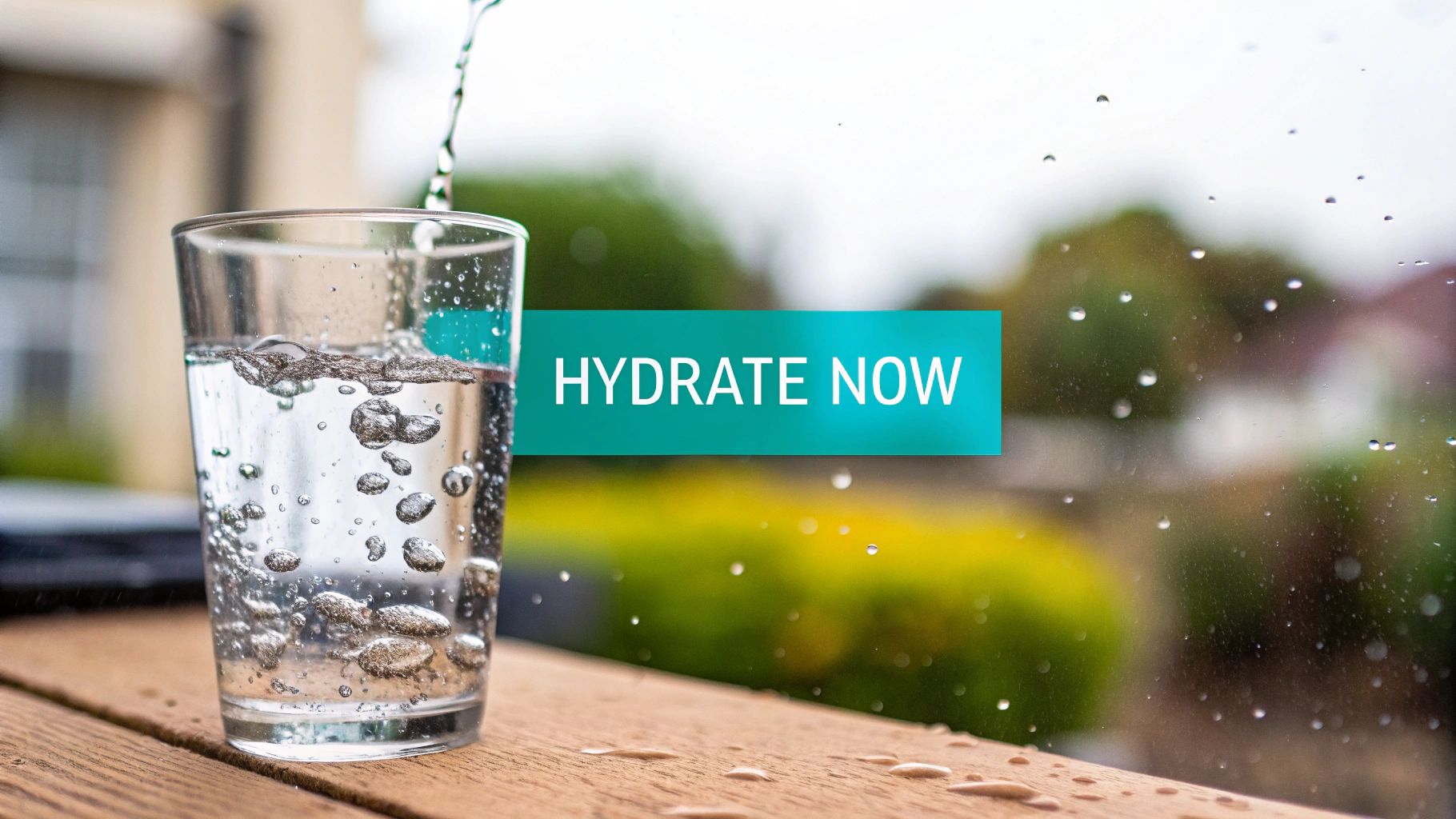

· By Annemarie
Best Way to Rehydrate After Drinking: Proven Science Tips
The Science Behind Alcohol-Induced Dehydration
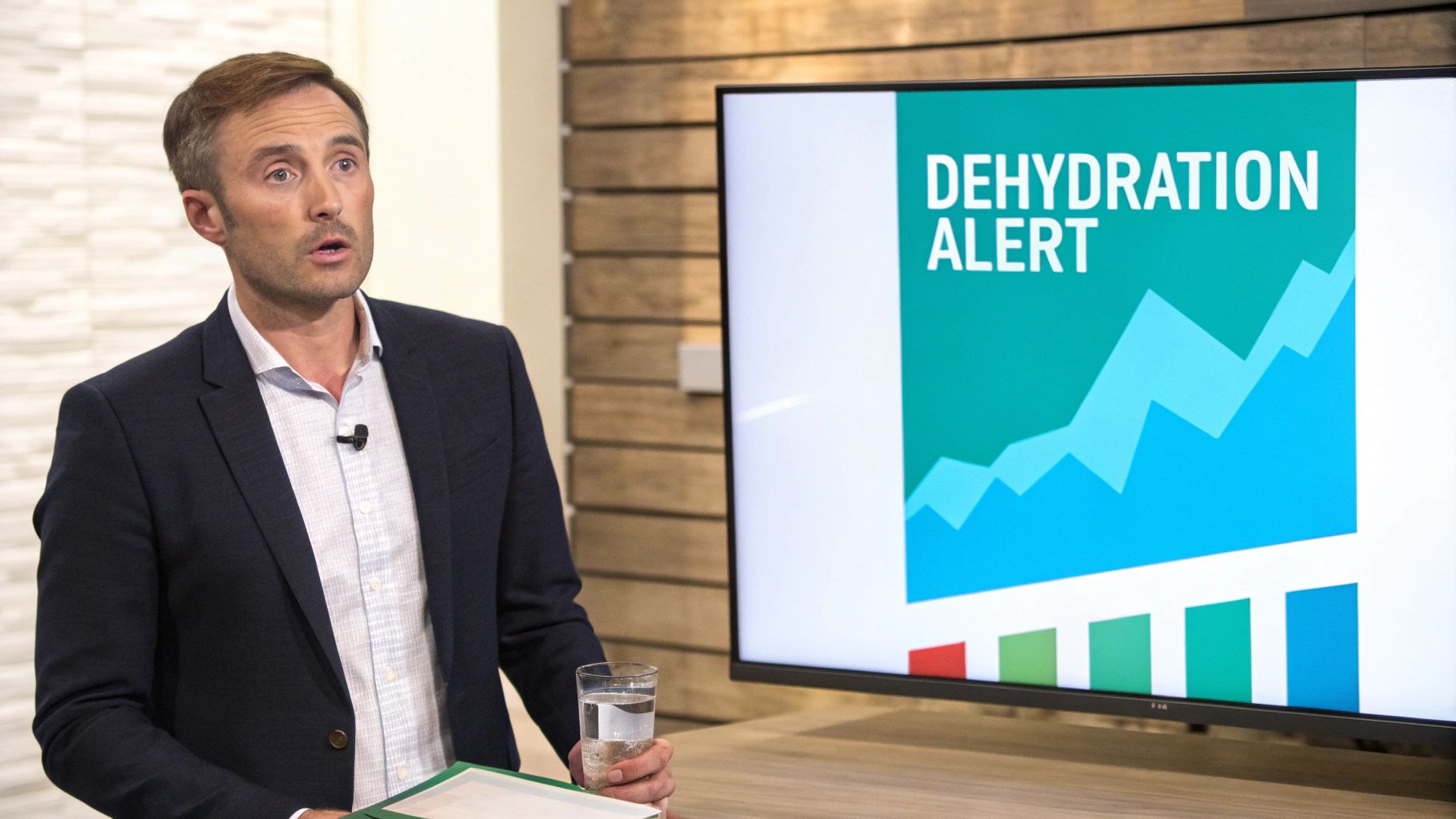
Alcohol, while a source of enjoyment for many, has a dehydrating effect on the body. This goes beyond simply feeling thirsty. It's a complex process that disrupts your body's fluid balance. Understanding this process is crucial for effective rehydration strategies after consuming alcohol.
The Role of Vasopressin
One of the primary ways alcohol dehydrates you is by affecting vasopressin, also known as antidiuretic hormone (ADH). This hormone is responsible for regulating water reabsorption in your kidneys. Normally, vasopressin signals your kidneys to conserve water, which in turn reduces urine production.
Alcohol, however, suppresses the release of vasopressin. This means your kidneys don't receive the signal to conserve water, leading to increased urination and subsequent fluid loss. A single alcoholic beverage can increase urination by four to five times compared to the same amount of water.
Electrolyte Imbalance
Alcohol also depletes essential electrolytes, such as sodium and potassium. These electrolytes are critical for maintaining proper fluid balance, helping your cells absorb and retain water.
When electrolyte levels are low, your body struggles to rehydrate efficiently. This can worsen dehydration symptoms like headaches and nausea. Therefore, rehydrating after alcohol consumption often involves replenishing not only water but also these lost electrolytes. In the United States, it is reported that 75% of adults suffer from chronic dehydration, which can exacerbate these symptoms. For more detailed statistics, check out this blog post: How Many People Are Dehydrated?
The Dehydration Timeline
The effects of alcohol-induced dehydration aren't always immediate. While you might feel thirsty while drinking, the most severe symptoms often appear hours later, as your body's vasopressin levels remain suppressed.
This delayed effect contributes to the dreaded "morning-after" hangover, often characterized by headaches, fatigue, and nausea. Addressing dehydration proactively, even before going to bed, can significantly improve your recovery.
Electrolytes: Your Secret Weapon for Rapid Recovery
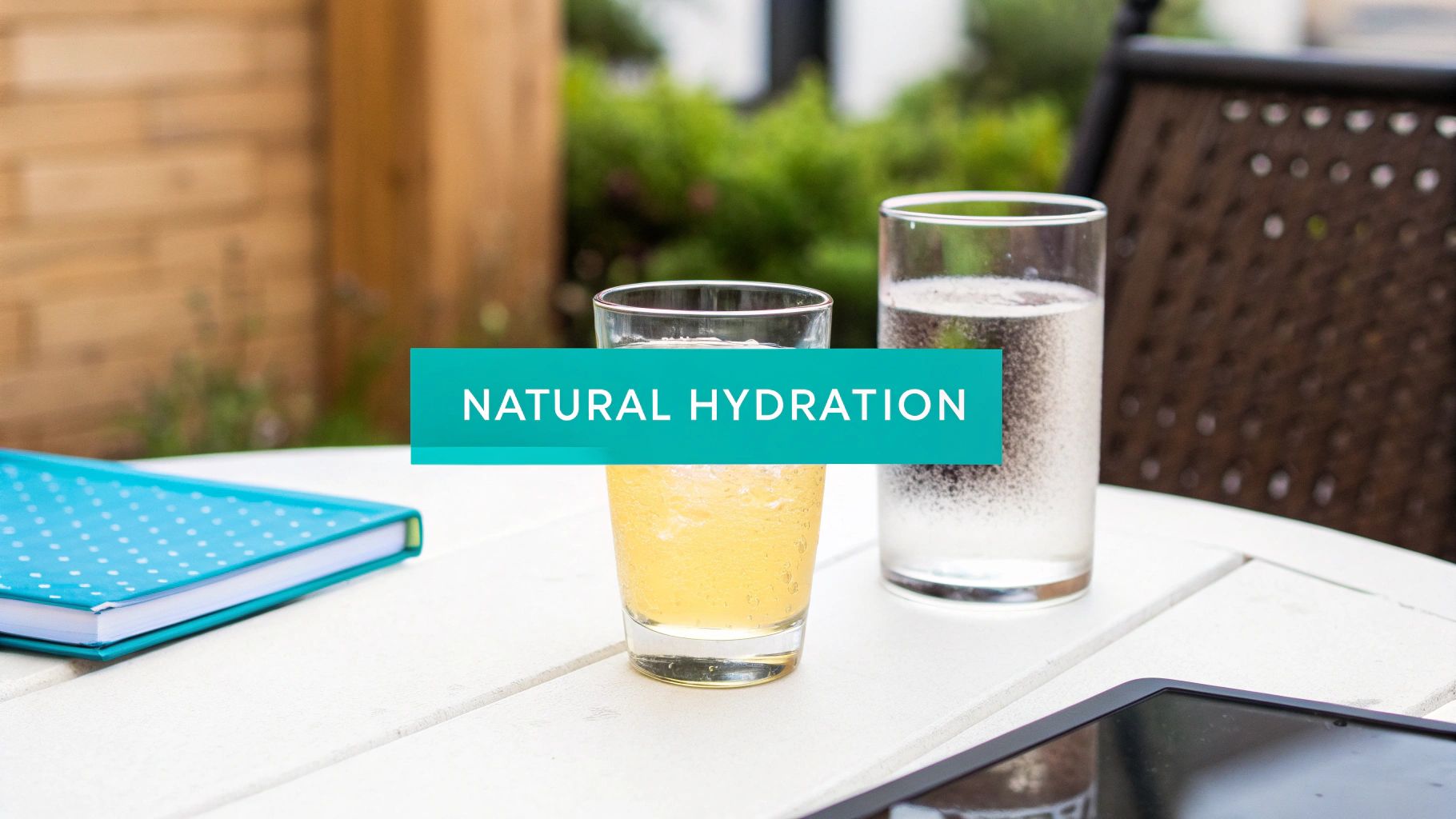
While addressing the suppression of vasopressin is key, there's another crucial aspect to rehydration after a night of drinking: electrolytes. Alcohol doesn't just dehydrate you; it also depletes these essential minerals, making it harder for your body to recover. This is why simply guzzling water often isn't enough.
Understanding the Electrolyte Loss
Alcohol consumption leads to a significant loss of key electrolytes like sodium and potassium. These electrolytes are vital for maintaining fluid balance. Sodium, for example, regulates the total amount of water in your body and plays a crucial role in nerve and muscle function. Potassium, on the other hand, helps regulate muscle contractions, nerve signals, and fluid balance.
Why Electrolytes Matter for Rehydration
Electrolytes are essential for fluid absorption. They create what's called an osmotic gradient, which helps pull water into your cells. Imagine your cells are like raisins (dehydrated). Electrolytes are the force that plumps them back up like grapes (hydrated). Without enough electrolytes, your body can't hold onto the water you drink, slowing down the rehydration process.
Key Electrolytes and Their Functions
Several electrolytes are especially important for bouncing back after drinking. Let's take a closer look:
- Sodium: Regulates fluid balance and is vital for nerve and muscle function.
- Potassium: Supports muscle contractions, nerve signals, and fluid balance.
- Magnesium: Plays a role in muscle and nerve function, blood sugar control, and blood pressure regulation.
- Calcium: Essential for muscle function, nerve transmission, and healthy bones.
Losing these electrolytes can cause a range of unpleasant symptoms, including muscle weakness, headaches, and nausea, making the effects of dehydration even worse.
To help illustrate the impact of alcohol on electrolytes and the best ways to replenish them, let's look at the table below. It provides a clear overview of the roles these electrolytes play and how to restore balance after drinking.
Electrolyte Depletion and Replenishment After Drinking
| Electrolyte | Function in Body | Depletion Symptoms | Replenishment Sources |
|---|---|---|---|
| Sodium | Regulates fluid balance, nerve and muscle function | Muscle cramps, weakness, nausea, headaches | Sports drinks, salty snacks, broth |
| Potassium | Muscle contractions, nerve signals, fluid balance | Muscle weakness, fatigue, irregular heartbeat | Bananas, oranges, potatoes, coconut water |
| Magnesium | Muscle and nerve function, blood sugar control, blood pressure regulation | Muscle cramps, fatigue, weakness | Leafy greens, nuts, seeds, dark chocolate |
| Calcium | Muscle function, nerve transmission, bone health | Muscle cramps, numbness, tingling | Dairy products, fortified plant milks |
As this table shows, focusing on replenishing these key electrolytes through various food and drink sources can make a real difference in how you feel after drinking.
Replenishing Electrolytes: What to Look For
To rehydrate effectively, replenish those lost electrolytes. You can do this by drinking electrolyte-rich beverages, eating specific foods, or using electrolyte supplements. Choosing the right approach is a crucial step towards feeling your best. More on this in the following sections!
Rehydration Beverages That Actually Work
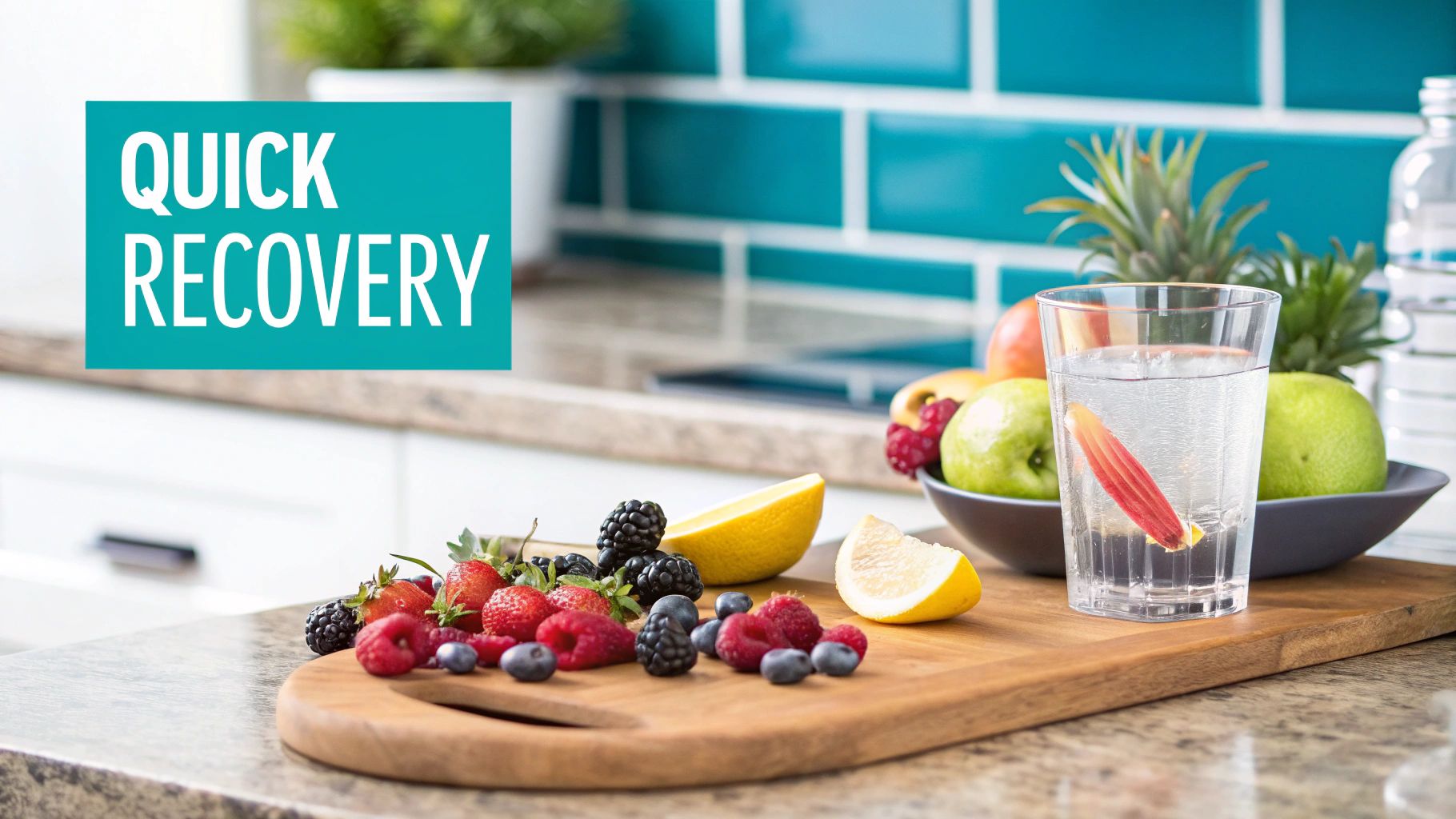
After a night out, understanding how to properly rehydrate is key. Choosing the right beverage can make all the difference in how you feel the next day. It's not about marketing hype; it's about what actually helps your body recover.
Water: The Foundation of Rehydration
Water is the most accessible rehydration option. It's essential for replacing lost fluids. However, water alone might not be enough, especially after a night of drinking. Alcohol depletes electrolytes along with fluids, and water doesn't contain these essential minerals. While crucial, water is just the first step.
Electrolyte Drinks: A Step Up From Water
Electrolyte drinks, like sports drinks or electrolyte-enhanced water, offer more than plain water. These beverages contain electrolytes like sodium and potassium, lost due to alcohol's diuretic effect. However, many commercial sports drinks have a downside: high sugar content. Some popular brands pack over 30 grams of sugar per serving, potentially hindering rehydration and impacting overall health.
Coconut Water: Nature's Sports Drink
Coconut water is a natural source of electrolytes like potassium and sodium. It’s a good option for rehydration, and it's often lower in sugar than many sports drinks. This makes it a healthier way to replenish electrolytes without the sugar overload. However, individual reactions to coconut water can vary.
Oral Rehydration Solutions (ORS): For More Severe Dehydration
ORS are designed to combat dehydration from vomiting and diarrhea. They have a specific balance of electrolytes and glucose to optimize fluid absorption. While generally not necessary for mild hangovers, ORS can help in severe cases and are available at most pharmacies.
Homemade Rehydration Solutions: A Cost-Effective Approach
Making your own rehydration drink is a budget-friendly and personalized option. A simple recipe combines water, a pinch of salt, and a potassium source like banana or orange juice. You can even add ginger or lemon for extra flavor. For additional gut health support, consider adding probiotics.
To better understand the importance of rehydration, let's look at some statistics. In the United States, water withdrawals per capita reached 1,207.34 cubic meters per inhabitant in 2022. Despite this high water availability, many still experience chronic dehydration from insufficient daily intake. For more on this topic, check out these Dehydration Statistics.
The following table compares different rehydration options based on several factors:
Rehydration Beverage Comparison: A comparison of different beverages for post-drinking rehydration, rating them on multiple factors including electrolyte content, absorption rate, sugar content, and overall effectiveness.
| Beverage Type | Electrolyte Content | Absorption Rate | Sugar Content | Overall Effectiveness | Best Used When |
|---|---|---|---|---|---|
| Water | Low | Moderate | None | Good for mild dehydration | Always a good starting point |
| Sports Drinks | High | Moderate to High | High | Good for moderate dehydration, but watch the sugar | After intense exercise or sweating |
| Coconut Water | Moderate | Moderate | Moderate | Good alternative to sports drinks | Mild to moderate dehydration |
| ORS | High | High | Moderate | Best for severe dehydration | Vomiting, diarrhea, or severe hangover |
| Homemade Solutions | Customizable | Moderate | Customizable | Cost-effective and tailored to individual needs | Mild to moderate dehydration |
This table summarizes key differences and helps you choose the right beverage. Consider your individual needs and the severity of your dehydration when making your selection. The right drink can be a game-changer in your recovery.
Strategic Timing: When to Hydrate for Maximum Relief
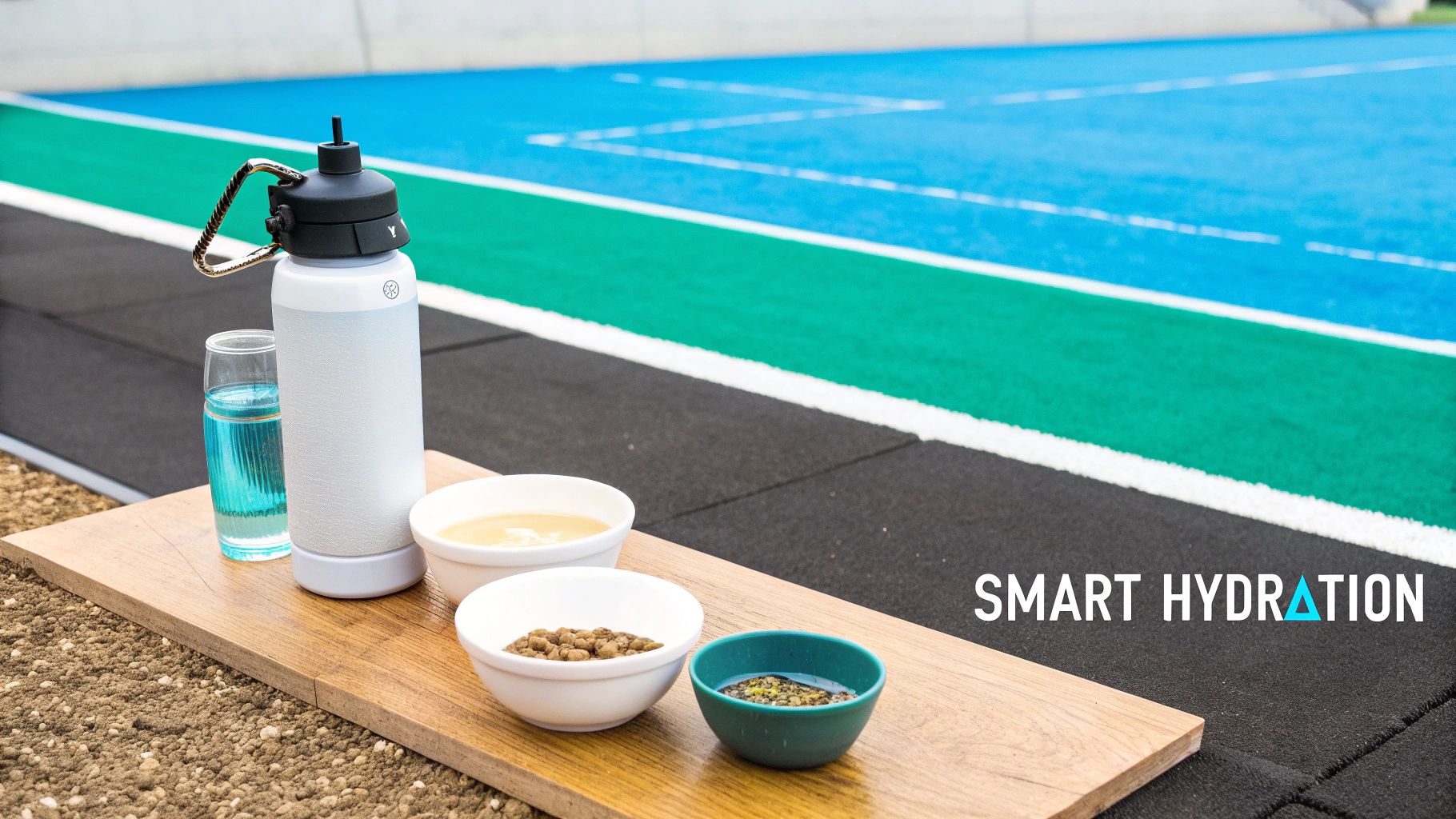
Timing plays a crucial role in effective rehydration. Much like a pre-workout routine primes your muscles, strategic hydration helps your body recover after alcohol consumption. This means knowing not just what to drink, but when.
Pre-Drinking Hydration: Building Your Buffer
Before you reach for that first drink, pre-hydration is essential. This builds a reserve of fluids and electrolytes, mitigating the dehydrating effects of alcohol. Think of it as building a protective barrier. Drinking a couple of glasses of water or an electrolyte drink a few hours beforehand can make a noticeable difference.
Alternating Drinks: Pacing for Success
Pacing yourself by alternating alcoholic beverages with water is a smart move. This helps maintain fluid balance and reduces your overall alcohol intake. A simple rule of thumb: for every alcoholic drink, have a glass of water. This helps keep dehydration at bay throughout the evening. Spacing out your drinks also gives your body more time to process the alcohol.
The Post-Drinking Golden Hour: Immediate Replenishment
The first hour after you stop drinking is vital. This is the golden hour for rehydration when your body is still processing alcohol, and dehydration starts to set in. Replenishing fluids and electrolytes aggressively during this time is key. A large glass of water or an electrolyte drink before bed can significantly reduce hangover severity. This quick replenishment counteracts alcohol's diuretic effects and supports your body's natural recovery. Interestingly, 1 in 9 people worldwide lack access to clean drinking water, contributing to global dehydration and related health issues. Learn more about this important topic here.
Morning-After Maintenance: Continued Hydration
Even with pre-bed rehydration, the effects of alcohol can linger. Continuing to hydrate the next morning is crucial for full recovery. Sipping water and electrolyte drinks throughout the morning can ease lingering symptoms and restore optimal hydration. This maintenance phase ensures your body fully recovers its normal fluid balance. Remember, rehydration is an ongoing process, especially after alcohol consumption.
Recovery Foods That Hydrate and Heal
After a night out, rehydrating is crucial. But beyond just grabbing a sports drink, focusing on food can significantly boost your recovery. Proper nutrition plays a vital role in bouncing back after alcohol consumption. This isn't about strict diets; it's about smart food choices that replenish and re-energize your body.
The Power of Nutrient-Rich Foods
While electrolyte drinks like Gatorade can help restore fluid balance, whole foods offer a broader approach. These foods provide not only water and electrolytes but also vital vitamins, minerals, and antioxidants. These nutrients support your body's natural healing processes, actively contributing to recovery.
Fruits and Vegetables: Hydration Heroes
Fruits and vegetables are your best allies for rehydration. Many are naturally packed with water and electrolytes. They offer a refreshing way to replenish what's lost after drinking alcohol. Watermelon and berries are excellent choices for hydration, rich in antioxidants that combat alcohol-induced inflammation. Bananas and oranges provide potassium, a key electrolyte lost while drinking. Spinach, a leafy green, is a good source of magnesium, supporting overall health.
Constructing the Ideal Post-Drinking Meal
The ideal post-drinking meal isn't about greasy comfort food. Instead, focus on a balanced combination of hydrating foods and those that support liver function.
- A smoothie with fruits, vegetables, and coconut water
- A light meal with eggs, whole-grain toast, and avocado
Eggs contain cysteine, an amino acid that helps your body break down acetaldehyde, a toxic byproduct of alcohol metabolism. This helps reduce hangover symptoms.
Supplements: Separating Fact From Fiction
Many supplements promise hangover relief. However, not all deliver. Some, like vitamin B complex and milk thistle, show promise. B vitamins are depleted by alcohol and are essential for energy production. Milk thistle is known for its liver-supporting properties. However, many other hangover supplements lack scientific backing. Always consult a healthcare professional before starting any new supplement regimen.
Foods to Avoid: Hidden Dehydrators
Some foods can worsen dehydration. Sugary foods and drinks can further deplete fluids and electrolytes. Processed foods often contain high levels of sodium, disrupting fluid balance. Caffeinated beverages, while tempting for a quick boost, act as a diuretic, similar to alcohol. Stick to whole, unprocessed foods and hydrating beverages.
By choosing the right foods, you can significantly improve your body's rehydration and recovery after drinking. This holistic approach not only addresses hydration but also supports your body's nutritional needs during recovery. Combining this with the right rehydration beverages creates a powerful strategy for bouncing back and feeling your best.
When DIY Isn't Enough: Professional Rehydration Options
Sometimes, even our best efforts at home just aren't enough. Knowing when to seek professional help for dehydration can prevent serious health complications. This section explores the limits of self-care and guides you on recognizing when professional intervention might be necessary.
Recognizing the Red Flags
While mild dehydration can often be managed at home with rest and fluids, severe dehydration requires immediate professional medical attention. Recognizing the signs is crucial for preventing serious health consequences.
- Severe thirst: This goes beyond a typical thirst; it's a persistent, intense need for water.
- Very dark urine or lack of urination: This indicates your kidneys aren't functioning as they should.
- Rapid heartbeat and breathing: Your body is working overtime trying to compensate for the fluid loss.
- Sunken eyes: This is a clear visual indicator of severe dehydration.
- Low blood pressure: This can cause dizziness and fainting.
- Confusion or disorientation: A sign that the dehydration is affecting brain function.
- Fever: When coupled with other symptoms, fever can worsen dehydration.
If you experience any of these symptoms, especially in combination, seek immediate medical attention.
Professional Rehydration: What to Expect
In cases of severe dehydration, medical professionals often use intravenous (IV) fluids. IV therapy delivers fluids and electrolytes directly into the bloodstream, bypassing the digestive system for rapid rehydration. This approach also addresses electrolyte imbalances more effectively than oral rehydration methods. It’s especially beneficial when someone can’t keep down fluids due to vomiting or nausea.
IV Hydration Therapy: Effectiveness and Considerations
IV hydration therapy is highly effective at quickly restoring fluid balance in severe dehydration cases. It’s a standard medical procedure in emergency rooms and hospitals. However, for mild to moderate dehydration, oral rehydration using water, electrolyte drinks, and hydrating foods is often the best approach. IV therapy is typically reserved for more serious situations.
Making the Decision: Self-Care vs. Medical Help
Deciding between self-care and professional medical help for dehydration can be challenging. Consider the severity and duration of your symptoms. If you're unsure, err on the side of caution and contact a healthcare professional. They can provide personalized guidance based on your individual circumstances. Early intervention can prevent serious complications and ensure a faster recovery.
Are you tired of feeling drained after a night out? Upside Hangover Sticks offer a convenient and effective way to support your body’s natural rehydration process. Developed with proven ingredients, these delicious jelly sticks are a simple and enjoyable step towards feeling your best. Learn more and take control of your recovery at Upside Hangover Sticks.
